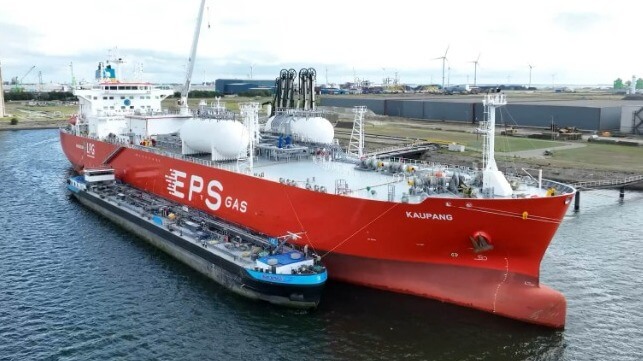Latest Biofuel Pilot Demonstrates Emission Reductions from Pilot Fuel Use

The Singapore-based The Global Centre for Maritime Decarbonisation (GCMD) reported that it completed the third in a series of five pilot projects for the supply chain of alternative fuels reporting they achieved and 83 percent reduction in carbon emissions. The pilot programs which are being independently verified and involve in-service ships are design to support the development of quality, quantity, and an assurance framework for drop-in fuels to be used with green house gas abatement programs.
Working with Eastern Pacific Shipping and the company’s mid-sized gas carrier the Kaupang (29,649 dwt), the pilot tested the use of a biofuel blend as a pilot fuel for the ship’s LPG propulsion. The propulsion plant requires a pilot fuel which is normally marine gas oil (MGO) but for the trial it was replaced with 200 MT of a B30 biofuel blend of hydrotreated vegetable oil (HVO) and marine gas oil (MGO).
The bunkering took place during the vessel’s port call in the Port of Vlissingen in the Netherlands and was supplied by GoodFuels. Produced from 100 percent waste and residues, the HVO used in this trial translates to an 83 percent reduction in well-to-wake emissions compared to using fossil MGO. The blending MGO with 30 percent biofuel as the pilot fuel for LPG combustion, demonstrated a 20 percent net reduction in emissions compared to the Kaupang sailing on VLSFO.
“The experiences from this trial will strengthen the development of our framework to provide emissions abatement assurance when it comes to paying a premium for green fuels over fossil fuels,” said Dr. Sanjay Kuttan, Chief Technology Officer of GCMD. “Through this pilot, we demonstrated using a biofuel blend with LPG can be a feasible pathway for ships to meet the recently revised IMO indicative decarbonization checkpoint for 2030.”
The center highlights several factors contributing to creating the quality and quality assurances to encourage the industry to move to the adoption of biofuels. Start on October 1, they highlight that new the Interim Guidance on the Use of Biofuels will come into effect from the IMO’s MEPC. The interim guidelines provide clarity on the types of biofuels that can be certified sustainable but the biofuels will also need to meet a minimum requirement of 65 percent emissions reduction against conventional fuel to be compliant.
This was the third pilot with the center previously successfully tracing two supply chains of FAME-based biofuels blends with synthetic DNA from production to consumption through Singapore. In this latest pilot, the supply chain trial involved inline tracer dosing and onboard blending to demonstrate that different tracing techniques can help ensure authenticity and quantity of sustainable biofuels in the supply chain.
In this most recent trial, GCMD collaborated with GoodFuels, Control Union, and IDS to deploy an element-based tracer in HVO to assure its origination and quantity in the biofuel blend. Unique to this trial, the tracer was dosed in-line with HVO and blended with MGO onboard the bunker vessel. Carbon dating was conducted to independently determine the biogenic carbon content given the chemical similarities between HVO and some of the components in MGO.

that matters most
Get the latest maritime news delivered to your inbox daily.
VPS witnessed the trial at all stages from biofuel transfer and onboard blending to bunkering aboard the Kaupang. VPS also conducted extensive laboratory tests on the biofuel and biofuel blend collected at numerous pre-determined points along the supply chain to assess quality.
GCMD has two remaining biofuels assurance framework pilots. According to the non-profit organization which was created to support decarbonization of the maritime industry, the experience and details of the assurance framework will be shared broadly through a public report in early 2024. The center was formed two years ago in August 2021 with funding from the Maritime and Port Authority of Singapore (MPA), and six founding partners. The founding companies include BHP, BW, DNV Foundation, Eastern Pacific Shipping, Ocean Network Express and Sembcorp Marine. Others in the industry including recently Japan’s NYK and Mitsui O.S.K. Lines (MOL), Mediterranean Shipping Company (MSC) and Hapag-Lloyd have also joined to support the center’s efforts.
